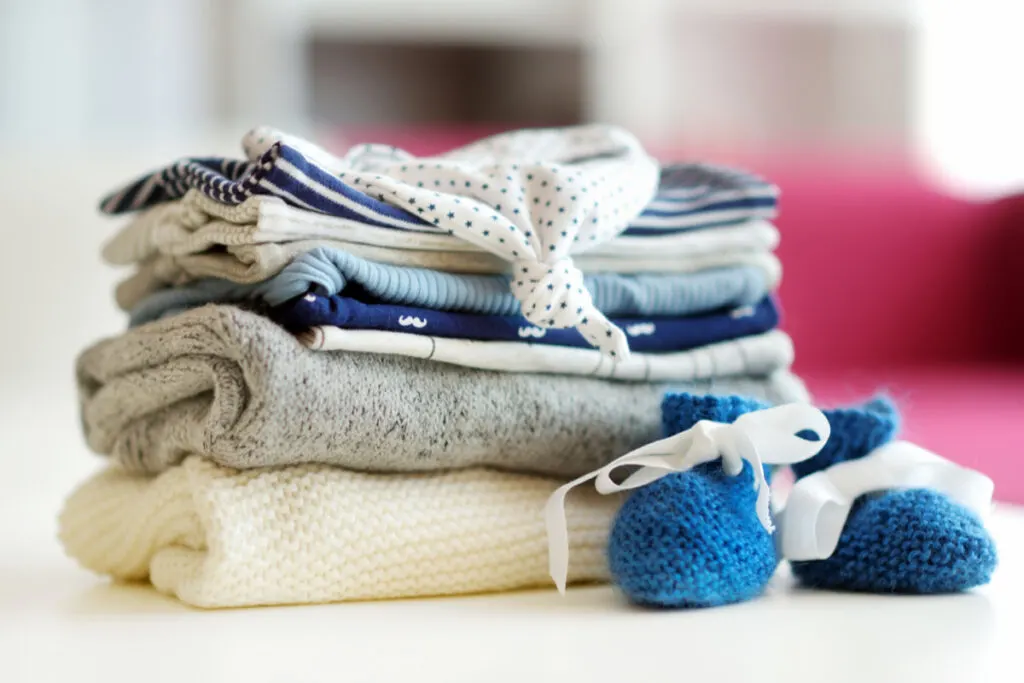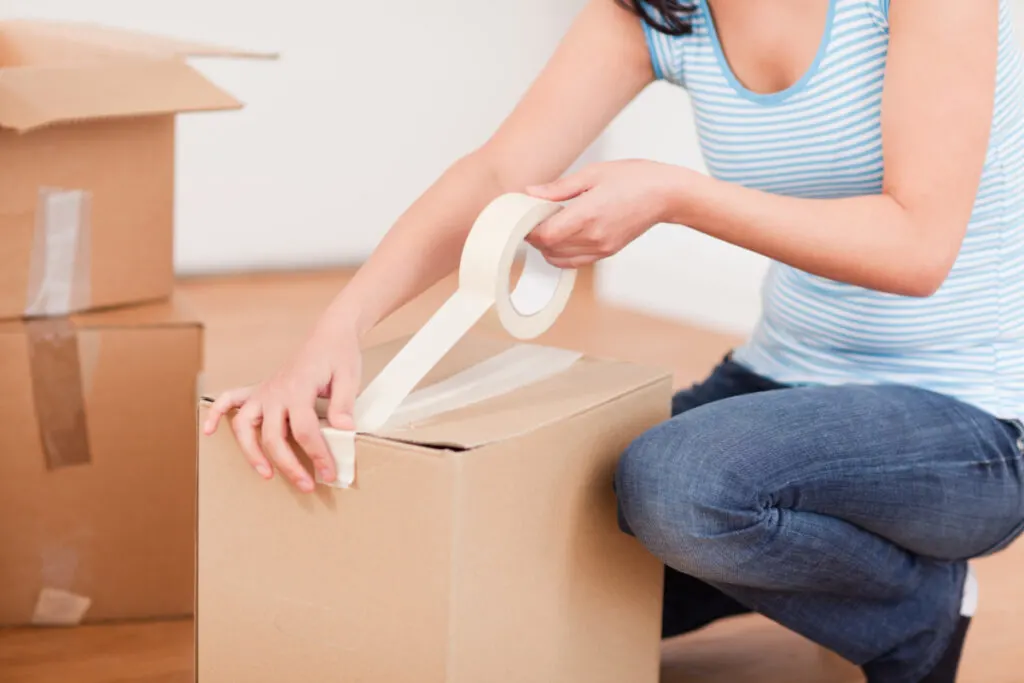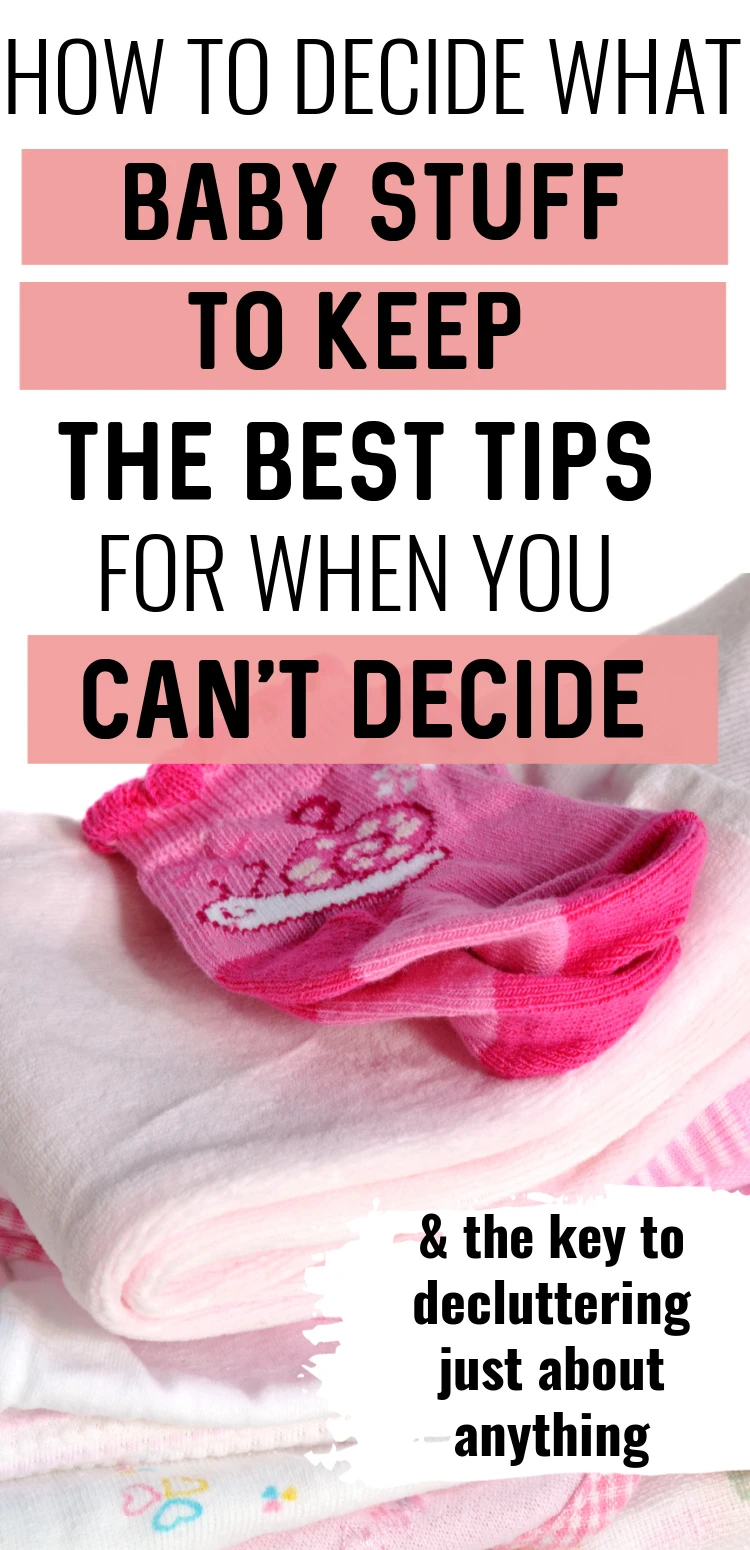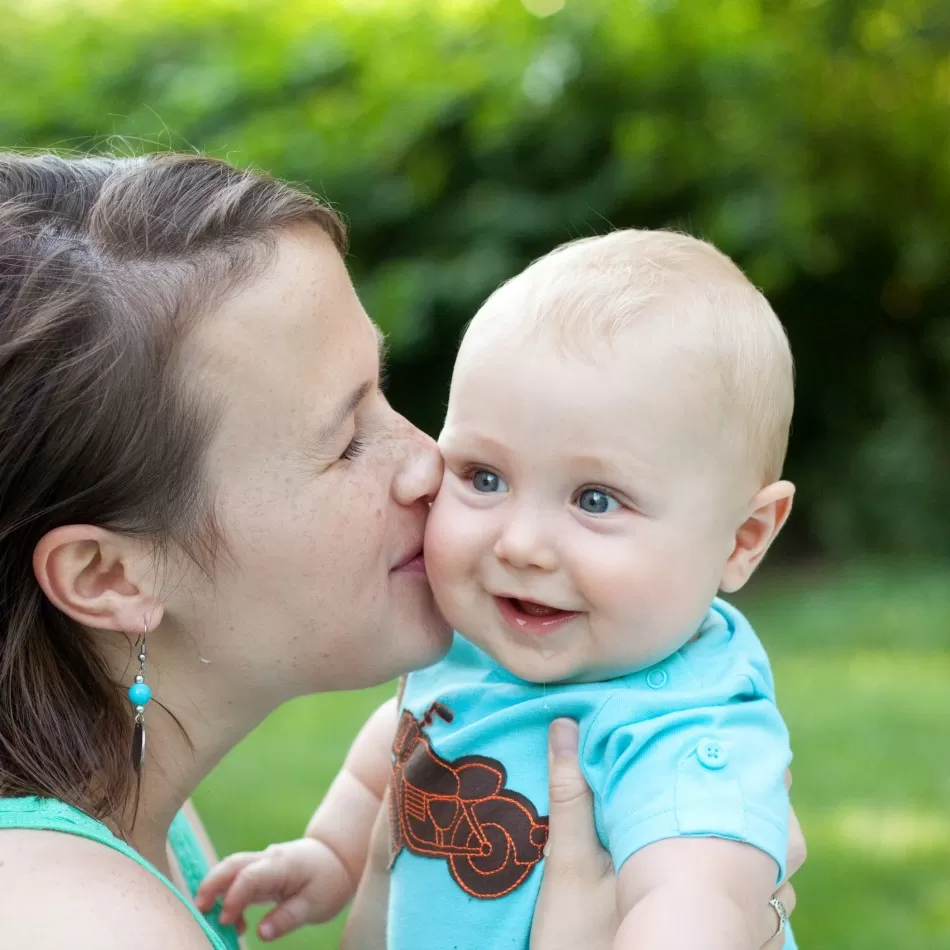Inside: As your baby grows into a toddler, you’ll probably wonder at some point, “What baby stuff should I keep?” Make difficult decisions easier with this straightforward advice for everything from sentimental items to big, expensive baby items.
Let’s face it: having a baby means you need a boatload of items that are in a constant state of turnover as your little one grows.
You’ll need bottles, blankets, bibs, clothes, a bed and bedding, baby books, diapers and more.
This is by no means an exhaustive list, and I hate to break it to you, but this is a permanent problem. Kids’ stuff is like a merry-go-round: things are constantly coming in and going out all.the.time. And so much ends up in your home NOT by your choice (I’m looking at you teachers, doctors, grandparents).
Some things seem to be worth keeping long-term, but how do you decide what is actually worth holding onto?
You Might Also Like: Realistic Self-Care Ideas for New Moms – Inexpensive & Practical

Why Baby Stuff Can Be a Beast to Declutter
THIS POST PROBABLY CONTAINS AFFILIATE LINKS. AS AN AMAZON ASSOCIATE, I EARN FROM QUALIFYING PURCHASES. YOU CAN READ OUR FULL DISCLOSURE POLICY HERE.
Baby items can be uniquely challenging to declutter for two reasons.
First, there’s SO MUCH expensive gear for this first stage of childhood! And companies keep coming up with things for parents to buy that promise to make the newborn stage easier (some work better than others, am I right?).
For good reason, many parents feel a strong aversion to getting rid of expensive stuff they may need to rebuy down the road, especially if it was all given to you at your first baby shower.
Quality, useful and expensive stuff you didn’t need to pay for and will need to shell out big bucks for if you need it later? The pull to keep it all is STRONG.
If you aren’t sure yet whether or not you want more children, making decisions about baby stuff can feel even more difficult.
Two, there’s nothing quite like the tug of tiny little baby things on our heartstrings. Especially if you loved the baby stage, they can practically hear them screaming at you, “KEEP ME!”
But don’t worry! If you’re agonizing over what to keep and what to give away, there are easy strategies that can help you decide.
Keep reading to learn what you can do to make the process of getting rid of baby stuff easy and organized.
Related: 9+ Ways to Give Away Baby Stuff (Donate Like a Pro!)
Should You Keep Baby Items At All?
There are so many memories tied up in the baby items gifted to you and the first milestone items.
- First spoons
- First shoes
- Favorite toys
- Favorite blankets
So it can be difficult to determine whether you should give up any of these items at all.
If you’re stuck wondering whether you should keep baby stuff, consider this:
If you plan to have more children, it helps to more significant number of baby items for the next child. This is a practical and frugal way to be prepared for your next addition.
If you don’t plan to have more children, you will need to get very honest with yourself about what you want to save. And most likely, you’ll be keeping items for purely sentimental reasons (which is ok!).
In either scenario, this information will go a long way in determining what is essential to keep and what things you can part with easily.
Keeping Baby Stuff for Purely Sentimental Reasons
So many memories are tied to your children’s physical possessions. It can be hard to let go of items with special meaning…but especially if you’re a sentimental person, it can feel like everything has special meaning.
So how do you decide which sentimental baby items to let go of?
Here are some great strategies that will help you decide which baby items to keep:
Set limits for yourself.
You need to decide in advance how much you can save. (This is true for practical items as well!)
Pick a container out and limit yourself to what will fit in the container, or decide you’ll only keep one outfit per year per child.
What matters here is that you set boundaries and stick to them.
Personally, I’m not very sentimental. Here’s what I decided to keep.
For myself, I kept only one short-sleeved onesie that each of my five children wore in turn when they were 12-18 months old. Because it’s Fenway Park onesie, it also doubles as a keepsake from the years we lived in Boston.
The other item I will probably keep long-term for myself is a board book copy of The Very Hungry Caterpillar. My last baby is almost three now, and she will probably be done with it in a year or two.
I plan on arranging both in a shadow box at some point to hang in our closet, where I will see them regularly.
Other than that, I kept the baby blanket crocheted by one grandmother and the baby quilts made by the other grandmother. These items will be saved until my kids are adults; then they can decide whether to give them away or keep them.
Consider taking photos if you have too many items to keep.
If you find yourself wanting to keep every little thing, consider that having a photo of your baby or child wearing the clothing or using a certain gift is way easier than storing the item forever and ever, amen.
Many people find that taking the photo gives them a sense of peace, and they can them to declutter the item easily.
Storing items you aren’t using means less space for other things. Is the storage space more useful for items you are actually going to use to make memories with your child as they get older, like bikes or camping gear?
You can recoup some of the costs of baby items by reselling or consigning them from a frugal standpoint; selling them while they are still relatively new means a bigger return.
If you do pack items away that you aren’t sure you want or need, put a time limit on how long you’ll keep them.
Setting limits – both physical and time-based – helps you prioritize what has the most sentimental value to you.
What items truly deserve taking up space in that precious container?

What Baby Stuff Should I Keep for Future Children? What to Discuss
Once you have a good handle on making the hard decisions about sentimental items, you can move on to evaluate items you may or not need for future children.
Make sure to discuss these with your spouse before you start decluttering baby stuff.
Storage Space
First, consider your home’s capacity for long-term storage.
It doesn’t do any good to hold onto an expensive car seat if the only storage space available is damp and moldy, so when you go to retrieve said car seat for the next baby, you realize it’s trash (ask me how I know).
If you don’t have the space, or you cannot properly store items in the space you do have, I would strongly consider selling on FB marketplace or eBay so that someone else can use them.
Expensive baby items have excellent resale value, and another parent will be so thankful to get quality items for less!
You can also do this in reverse if another baby comes along unexpectedly or before you planned. Buy items used from the same venues to save money and lessen your decluttering regret.
Family Planning
Second, consider how soon you might be expecting another child.
I know, I know, pregnancies don’t always happen according to plan. But if you know you are planning to space your children a significant amount, say 4-5 years, holding onto items just doesn’t make sense, especially since you don’t know the gender.
You could also make a rule of thumb that if your next baby is the opposite gender, you will give away the bin of clothes you were saving.
I held onto a small number of my oldest daughter’s baby clothes (just my favorites) until my fourth child was declared a boy by the ultrasound technician. At that point, I had the stuff in storage for almost five years!
In retrospect, I should have given the girl clothes away after I found out that my third baby was a boy. They sat in our basement for years, just taking up space.

General Guidelines for Keeping Baby Stuff (By Category)
If you do decide to store items for future children, here are some general guidelines for various “baby stuff” categories.
Baby Clothes
If you do decide that you want to save clothes for future babies, first sort through and remove any clothing that is damaged or stained. When you finish, arrange what you have by size and keep a reasonable amount in each category.
For instance, if you have 30 pairs of baby socks, decide to keep ten pairs. If you have five winter jackets for some reason, keep two, and so on.
Again there are no hard and fast rules here, just set some guidelines and stick to them. Often it can help to choose a container (we use bins like this one), and limit what you keep to that container only.
For More: Keeping Clothes for the Next Baby – Top Do’s and Don’t’s from a Mom of 4
Strollers, High Chairs, Car Seats and Cribs
These are high-ticket items, as I’m sure you know. If they are in good shape and still meet safety regulations, you can definitely reuse them.
If you are storing them in a basement or attic, make sure to put things like car seats in large plastic bags (clear bags for leaves work well). Mold and rodents will almost certainly ruin them if you don’t take proper precautions.
Bottles, Pacifiers and Nipples
Keep all the bottles! Bottles are designed to be reused, so they keep for a reasonable amount of time.
Pacifiers and nipples are made of material (rubber and silicone) that can break down over time with use. These will need to be recycled or given away, and later replaced.
Toys
Go through what you have and remove any toys that are broken or damaged.
If you think any of the toys will be useful for your next wee one, set them aside. Give yourself one container, and when you fill it up, give the rest away.
Keep in mind that babies won’t need the toys until they are at least six months old or more.
So if you aren’t planning on another baby right away, they will be in storage for a minimum of eighteen months. And grandparents or relatives might buy new toys for baby number two, even if you insist that you kept toys from your first baby.
Other options to consider are donating to a thrift store or doctor’s office, or pass them along to a friend whose baby can use them. If you are intending to lend them – i.e. you want them back when her baby can no longer use them – make sure to clarify in advance.
Blankets, Sheets and Bibs
These items are often washed over and over again. If they are worn and stained, move them over to the rag pile.
Feel free to keep whatever items are clean and not heavily damaged. Again, limit the amount you keep to a specific container based on your storage limitations.
If they are heirloom items like a handmade quilt or baby blanket, you can create a special box for your child of things they will want to keep long-term.
Ointments, Lotions and Creams
Check to see if there’s an expiration date and get rid of anything that is expired or close to expiring. There’s no need to hang on and store items like these that have limitations; if you do not have a cool, dry place to store them, consider throwing them out.
They are easy enough to replace.
You Might Also Like: Minimalist Baby Essentials – 9 Things You Absolutely Need for Baby
Did You Notice The Common Thread?
You probably noticed the common thread throughout these categories: the key to making decluttering easy is to set limits on how much you want to keep by using containers.
When you know in advance how much room you have to store items, it can be easier to let things go.
Give yourself permission to let go of broken and damaged items. Sometimes, that can be difficult, especially if you have frugal tendencies or come from poverty.
If you can’t decide whether to keep items or not, put them in a box, and give yourself a time limit to decide.
Once you actually start the process of decluttering your baby items, you’ll be amazed at how much easier it is when you have a plan and methods to help you make fast decisions.

Choosing to Own Less Stuff Can Change Your Life
Finally, remember that you are probably far more attached to baby stuff than your child will ever be. Your attitude towards physical possessions will heavily influence your child’s perspective on stuff as he/she grows older.
Do you want your child to believe that physical things hold memories, to the point where they feel the need to keep every little thing because it has a happy memory?
Do you want your child to keep everything because he’s afraid he might need those things one day (even though that day often never comes)?
While your child is young, you have a chance to evaluate your relationship with stuff. Don’t miss this opportunity!
Minimalism has made a huge difference in my life as a mom. When I had three children four and under, I felt like I was drowning. Keeping up with all the stuff in our home on top of motherhood felt like an impossible burden.
But once I discovered minimalism and decluttered our stuff? I cannot even describe the amount of freedom and lightness and peace I felt.
At the very least, explore the pros and cons of a minimalist lifestyle. Read a few books about minimalism, and see if it could be the right lifestyle for you and your family.
I wish I’d known about minimalism before I started having kids. But the next best thing is being able to help a new mom discover this lifestyle at the beginning: it could seriously change your life.
Read Next: How to Manage Housework with a Baby – Super Simple Tips


Owner of Growing Serendipity, June could talk to you all day about homeschooling, parenting, and minimalism, which she does at This Simple Balance. When she’s not homeschooling, decluttering, or blogging, she loves to enjoy perfect silence while sipping a hot cup of coffee and thinking uninterrupted thoughts—which, of course, with five kids, doesn’t happen very often.